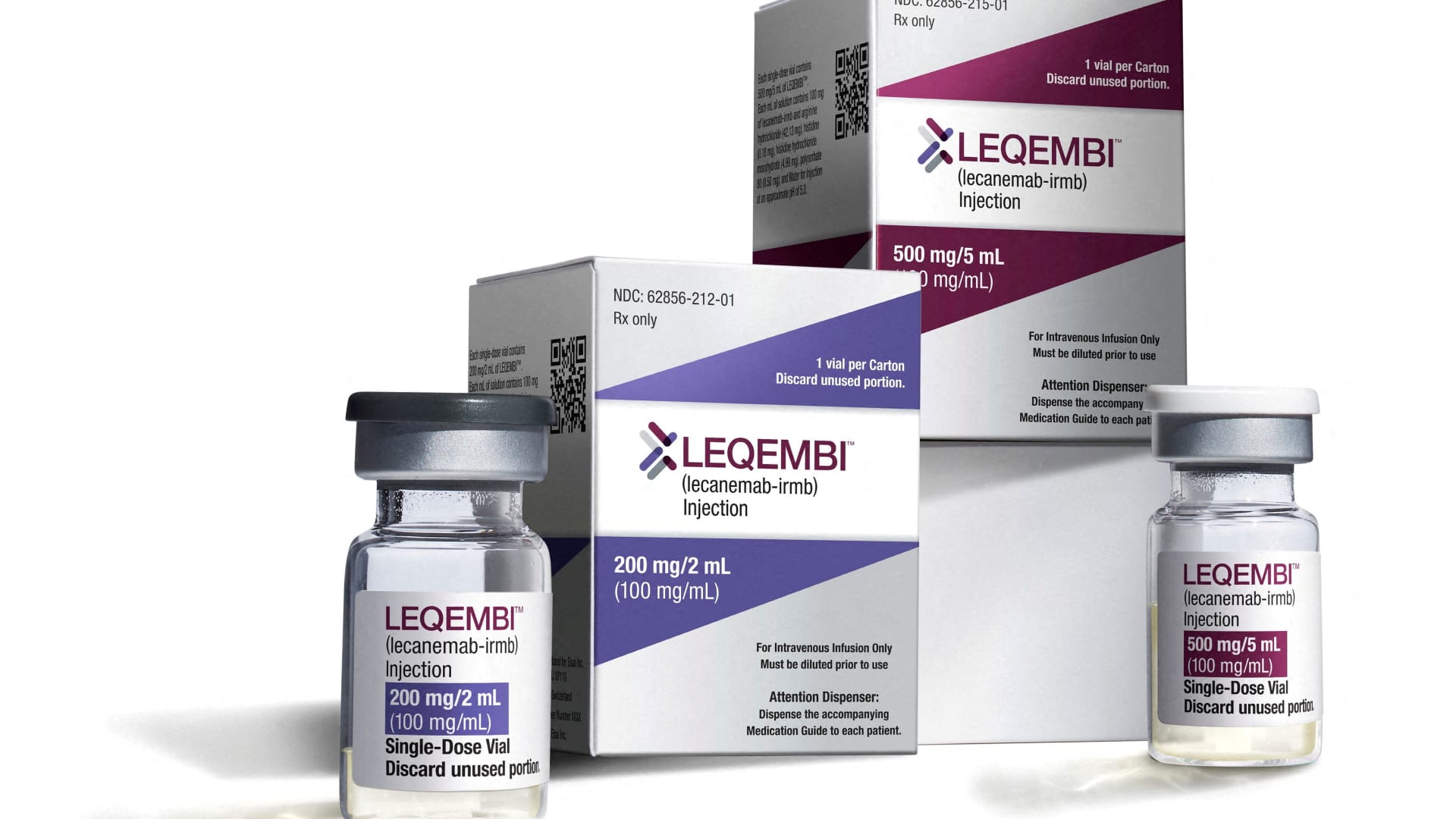The Alzheimer’s drug Leqembi is seen in this undated handout image obtained by Reuters on January 20, 2023.
Eisai | via Reuters
Medicare has reached an agreement to cover the costs of the Alzheimer’s treatment Leqembi, marking a significant milestone for patients in the early stages of the disease.
Leqembi is currently the only drug on the market that has proven its ability to slow down the progression of early-stage Alzheimer’s in clinical trials. Administered intravenously twice a month, this monoclonal antibody has shown a 27% reduction in cognitive decline over an 18-month period.
Developed by Japanese drugmaker Eisai and its partner Biogen, based in Cambridge, Massachusetts, Leqembi’s coverage by Medicare will improve accessibility for patients.
Medicare coverage plays a crucial role in enabling most patients to afford Leqembi. With a price tag of $26,500 per year before insurance, this treatment is prohibitively expensive for Medicare patients, who typically have a median income of around $30,000.
Although Medicare will cover the majority of the expenses, patients may still face several thousand dollars in out-of-pocket costs. Traditional Medicare patients will be responsible for 20% of the bill, potentially resulting in an annual payment exceeding $5,000, according to estimates from KFF, a non-profit organization dedicated to healthcare research.
Similarly, individuals with Medicare Advantage plans typically pay 20% of the costs, up to their out-of-pocket maximum, which averages around $5,000 for in-network services. The specific amount patients with supplemental insurance such as Medigap or Medicaid will pay may be lower, according to KFF.
Tricia Neuman, a Medicare expert at KFF, expressed concern that individuals with lower incomes, particularly Black and Hispanic people who are at higher risk of Alzheimer’s disease, may struggle to afford Leqembi’s out-of-pocket expenses even with Medicare coverage.
If the demand for Leqembi is high, there is also a possibility of patients experiencing long wait times to see specialists and receive infusions.
What are the coverage conditions?
Medicare has established specific conditions that must be met for patients to be eligible for Leqembi coverage.
Leqembi coverage requirements
- You must be enrolled in Medicare.
- You must be diagnosed with mild cognitive impairment or mild Alzheimer’s disease with evidence of amyloid plaque on the brain.
- You must have a doctor who is participating in a registry that collects information about the tests you have undergone as part of your diagnosis, whether you are on blood thinners, and any side effects you have experienced from Leqembi.
To receive a diagnosis of Alzheimer’s or mild cognitive impairment, patients must undergo a cognitive evaluation and undergo a PET scan or spinal tap to detect the presence of amyloid protein associated with the disease. PET scans are the most commonly used method as they are less invasive.
Currently, Medicare covers a single lifetime PET scan to detect amyloid. However, CMS is reviewing this policy and plans to issue a proposed rule in the near future, according to an agency spokesperson.
The requirement for doctors to enter patient information into a registry system has generated controversy. The Alzheimer’s Association and some members of Congress are concerned that this data-collection requirement adds unnecessary bureaucratic hurdles for patients seeking treatment.
The Centers for Medicare and Medicaid Services has established a nationwide portal to facilitate doctors in entering the necessary patient information. CMS has released a video demonstrating how doctors can navigate the system:
Doctors can access the free-to-use registry on this website.
Dr. David Knopman, a neurologist specializing in Alzheimer’s disease at the Mayo Clinic in Minnesota, believes that the registry is minimalist and unlikely to impose significant burdens on patients and physicians.
What are the benefits and risks?
CMS advises patients diagnosed with mild cognitive impairment or mild Alzheimer’s disease to consult with their doctors to evaluate whether the benefits of Leqembi outweigh the risks.
While Leqembi demonstrated a modest reduction in cognitive decline during the clinical trials, it also carries the serious risks of brain swelling and bleeding. In the trials, 13% of patients receiving Leqembi experienced swelling, and 14% experienced bleeding.
Although the swelling and bleeding were generally mild and asymptomatic, these episodes can be fatal, according to the independent review of the trial data conducted by the FDA. Symptoms of these side effects may include headache, confusion, dizziness, vision changes, and nausea.
Individuals with two copies of the APOE4 gene mutation are at higher risk of experiencing swelling and bleeding, and should be tested to confirm the presence of the mutation before taking Leqembi, as Medicare covers testing for this mutation, as stated by a CMS spokesperson.
Patients on anticoagulants also appear to have an increased risk of brain bleeding, according to the FDA.
In the clinical trial, three patients who received Leqembi died; however, the FDA was unable to determine whether these deaths were directly related to the treatment.
According to Dr. David Knopman, appropriately diagnosed and informed patients should have the autonomy to decide whether they want to proceed with Leqembi treatment after carefully weighing the potential benefits against the risks of serious side effects.
Denial of responsibility! VigourTimes is an automatic aggregator of Global media. In each content, the hyperlink to the primary source is specified. All trademarks belong to their rightful owners, and all materials to their authors. For any complaint, please reach us at – [email protected]. We will take necessary action within 24 hours.


